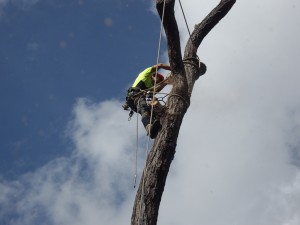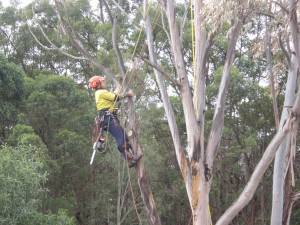 By the time you read this, you may be in time to go and see the QLD Tree Climbing Competition on August 15-16, which will be held near Noosa at a stunning venue.
By the time you read this, you may be in time to go and see the QLD Tree Climbing Competition on August 15-16, which will be held near Noosa at a stunning venue.
Climbing competitions are not just about super-fit adrenaline-pumped tree climbing competitors – even though most are all of the above and also work in the industry on a daily basis – they also have an important part to play in an educational sense.
Currently in our industry we do not have an approved code of practice in place as an industry standard for all aspects of our industry. A lot of equipment and techniques are based upon best practice and overseas standards.
The various competitions held annually in most states culminate with the national competition with the winners competing in the world climbing competition.
Knowledge is power and you will always benefit from more.
These events generally showcase some outstanding climbing skills and innovative techniques that can be used in most cases to improve productivity and reduce hazards and injury in our everyday workplaces.
Although you may find many hours of advice and demonstrations by searching online, we at Training For Trees believe that online research, while a valuable tool, is not the best way to teach yourself how to be an arborist. So as part of the development and training process we mix classroom and theory with real-world skills development in a real-live workplace.
It’s also a benefit for anyone in the tree industry to attend arboricultural shows and competitions to see new techniques and equipment being used and demonstrated by the professionals in the real-world environment.
The QLD competition also has a section where rookie climbers are encouraged to enter and have a go, usually with some pretty good prizes up for grabs.
With all of that happening, and with at least one other main arboricultural show scheduled for this year, it promises to be a good one. Don’t forget, knowledge is power and you will always benefit from more. Another major event happening this year, that may go unnoticed but has huge importance on the future of our industry, is the major shake-up of industry skills councils that the government proposed in July of this year.
No one really knows the outcome it will produce and we just hope it’s for quality and efficiency reasons and not just to save money. Let’s hope the current project to update and revamp some or all of the training packages for arboriculture retains its funding and reaches a satisfactory outcome.
Training For Trees has been involved with this project for some time as have a number of other industry experts and organisations. The latest development is the proposed developments to our industry training package, which will be published for broad consultation and the hope is that industry will have a chance to comment constructively.
Keep a look out for the chance to have a say in the future of our industry and its training and assessment requirements. It needs to be done right this time around
as there probably won’t be another opportunity to go through this process again for several years and will affect all levels from basic to Diploma level.

One of the current proposals, amongst many others, is to allow individuals to undertake and qualify as an arborist with the trade level Certificate III in Arboriculture with different streams officially recognised, such as:
- Ground based-arborist
- EWP arborist
- Climbing arborist
This would allow for individuals who have no desire to climb or use an EWP to qualify as an arborist but be ground based. Certification would be clearly defined and feedback so far appears to be in favour of this proposal. These proposals have been based on advice from industry groups and extensive consultation and discussion that has been going on for quite some time.
So it may finally provide answers to the age old questions:
- What is an arborist?
- Must a qualified arborist also work at heights from a rope and harness?
- Can you qualify as an arborist if you don’t climb but work from an EWP?
- Why can’t a qualified arborist be ground based?
Watch this space and make sure you provide input when the chance arises. If you are thinking about undertaking some form of arboricultural qualification pathway then now is the time to start.
The current Certificate III in Arboriculture can be completed as a climber or with the aerial components completed from an EWP and considerable funding is available to assist you in its completion. Consider your strategy for training and how you can keep your existing qualifications up to date.
Within the current WHS legislation there is a general obligation for everyone in the workplace, with a major emphasis on everyone, to act with due diligence. This translates to mean the care that a reasonable person must exercise to avoid harm to themselves or others in and around the workplace. It is a pretty open- ended concept, placing obligations on everyone while they are at work including employers, the self-employed and employees with the general requirement to carry out their duties. As responsible operators it is also a requirement for everyone to receive training for their roles and to be deemed competent and current in their required skills.
One way to demonstrate compliance with these requirements is to attend regular training and update courses which are designed to maintain essential skill levels. Regular refresher and update training and assessment programs to suit relevant skills as required are offered at Training For Trees.
Once a unit of competency or a full qualification is attained attending refresher and update days is a good way to ensure qualifications are kept up to date with the latest requirements. This is an effective way to ensure bad habits are identified and rectified with further training.
Operator training and certification is available through Training For Trees. Persons that are trained and certificated generally have a greater understanding
of operations and the required outcomes. The end result is usually seen in less downtime and maintenance requirements and ultimately in the reduction of accidents and injuries.
“Everyone engaged in carrying out work with trees must be trained and qualified in their designated task and strive to maintain and improve their industry currency by continuing to gain
relevant experience and qualifications”.
Training is as important as the servicing of vehicles and machinery, after all, workers are the machinery required to operate your business. It has been proven that independent training and assessment increases staff retention, safety, awareness, productivity and efficiency. Remember to schedule regular refresher and update training sessions.
For full trade level qualifications and apprenticeships to meet the industry standard requirement to be classified as an arborist/tree worker you will need to undertake AHC20513 Certificate II in Arboriculture which is a good pathway to follow towards becoming a qualified working arborist and undertake the AHC30810 Certificate III in Arboriculture. Funding incentives currently apply to eligible applicants and their employers in QLD
Training is as important as the servicing of vehicles and machinery, after all, workers are the machinery required to operate your business. It has been proven that independent training and assessment increases staff retention, safety, awareness, productivity and efficiency. Remember to schedule regular refresher and update training sessions.
For full trade level qualifications and apprenticeships to meet the industry standard requirement to be classified as an arborist/tree worker you will need to undertake AHC20513 Certificate II in Arboriculture which is a good pathway to follow towards becoming a qualified working arborist and undertake the AHC30810 Certificate III in Arboriculture. Funding incentives currently apply to eligible applicants and their employers in QLD.


